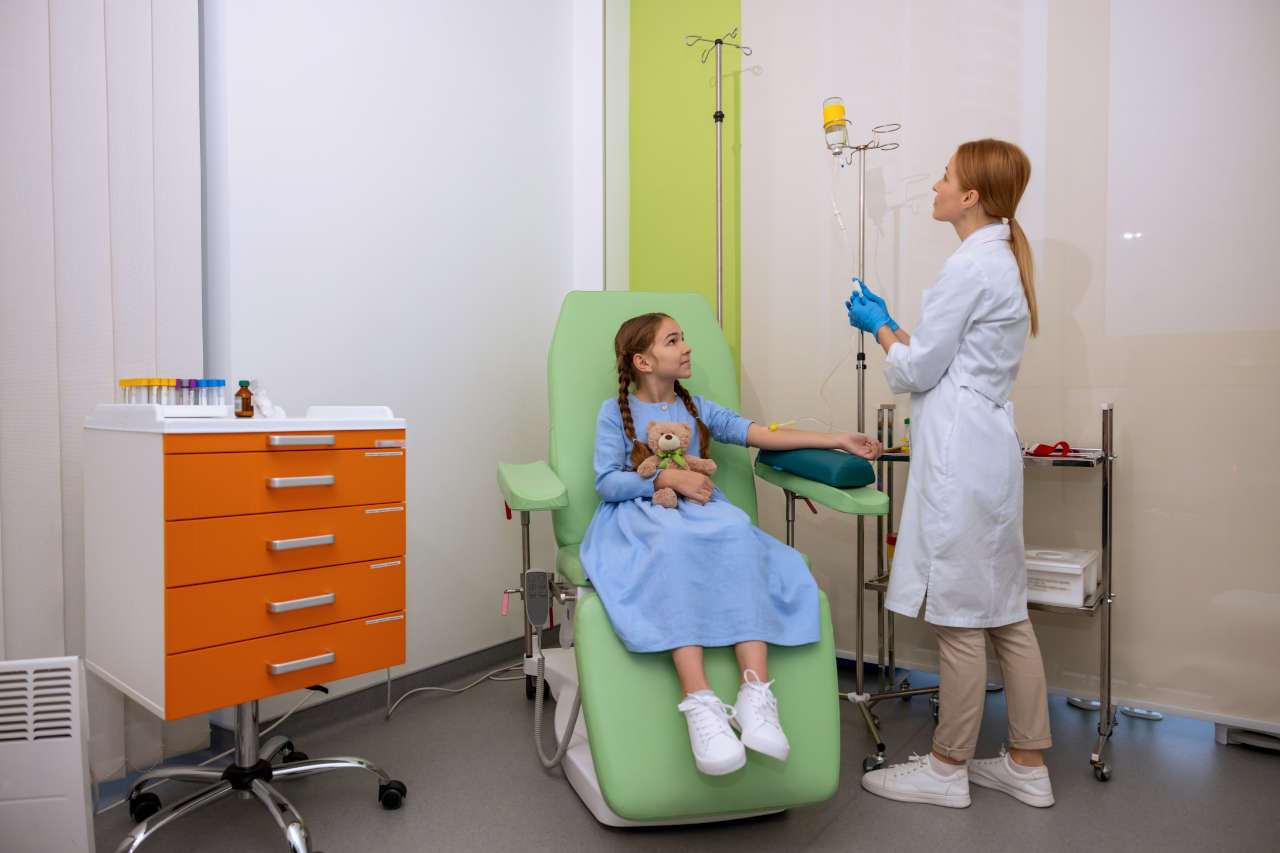
- IVIG for PANS/PANDAS is considered when symptoms are severe, disruptive, or rapidly onset after infection, especially if standard treatments have failed.
- Scientific evidence shows that IVIG therapy for PANS/PANDAS can lead to significant symptom reduction, with some children experiencing improvements lasting for months to nearly a year.
- Severe risks of IVIG treatment for PANS/PANDAS include allergic reactions, anemia, and aseptic meningitis-like illness.
- IVIG is costly and often used off-label as it’s not FDA-approved specifically for this condition.
If your child is living with PANS/PANDAS, IVIG can be an effective treatment option for managing it, especially in severe cases.
Ask About IVIG Home Infusion
For some families, however, the cost of IVIG treatment for PANDAS can be an issue. For others, the lack of access to IVIG can make things difficult as well.
In this article, you will get the latest information about when to consider IVIG therapy for PANS/PANDAS, the treatment costs, potential risks, and more.
A Quick Overview of PANS/PANDAS
Before discussing the benefits of IVIG for PANS/PANDAS, we must first understand the condition. Here is a quick overview of PANS and PANDAS.
PANS
PANS is an acronym for Pediatric Acute-onset Neuropsychiatric Syndrome.
It is a medical condition that causes children to develop abrupt, possibly overnight, obsessive-compulsive disorder (OCD) or eating restrictions. In addition, they may also exhibit symptoms of depression, irritability, anxiety, sleep disturbances, and problems with schoolwork.
The exact cause is unknown. However, it is believed that infections, metabolic disturbances, or immune reactions may trigger PANS.
PANDAS
PANDAS is an acronym for Pediatric Autoimmune Neuropsychiatric Disorders Associated with Streptococcal Infections.
IVIG is an effective solution for PANDAS, which is characterized by sudden OCD or tics (involuntary movements) following a recent streptococcal infection, such as strep throat or scarlet fever.
PANDAS patients may also display symptoms of irritability, emotional changes, anxiety, and problems with schoolwork.
PANS/PANDAS is a rare condition. According to a new 2023 study, the estimated annual incidence of this condition is 1 in nearly 12,000 children between 3 and 12 years old annually [1].
Are PANS and PANDAS Different Conditions?
PANDAS is a type of PANS, specifically linked to streptococcal infections and characterized by sudden OCD or tics following strep.
PANS, on the other hand, encompasses a broader range of triggers, including infections, metabolic issues, and immune responses that lead to neuropsychiatric symptoms.
Both conditions involve the immune system but differ in their underlying causes and diagnostic criteria. However, the two conditions also share many symptoms and treatments, hence why we refer to them as PANS/PANDAS here.
1. When To Consider IVIG for PANS/PANDAS

The PANDAS Physicians Network strongly recommends considering IVIG therapy for PANDAS if the symptoms cause significant interference with your child’s daily functioning.
You should work with your child’s provider and specialists to decide if IVIG is appropriate for your child.
Not all children need IVIG. Experts say that only 10% to 15% of children require IVIG. About 1 in 20 children will require long-term IVIG treatment for PANDAS [2].
Let’s look closer at when it might be beneficial or even necessary to consider IVIG for PANS/PANDAS.
Get IVIG Prior Authorization
When Symptoms Are Severe and Disrupt Daily Functioning
Sometimes your child’s neuropsychiatric symptoms may disrupt daily activities such as attending school, interacting socially, and participating in family routines. In these instances, you should strongly consider IVIG for treatment.
When symptoms are debilitating and persistent despite behavioral or pharmacologic treatment, IVIG offers a promising option to reduce their severity and allow your child to enjoy ordinary activities.
When Symptoms Have a Rapid, Abrupt Onset Following Infection
In cases where neuropsychiatric symptoms such as OCD or tics develop suddenly over hours or days, particularly after a documented streptococcal infection or other immune-triggering illness, IVIG should be evaluated for PANS/PANDAS.
Rapid onset of symptoms suggests an immune-mediated process, possibly involving autoantibodies attacking brain structures like the basal ganglia. Studies support that immune modulation via IVIG can attenuate the autoimmune response, thereby reducing neuroinflammation and symptom severity.
Considering IVIG therapy for PANDAS in these scenarios may prevent symptom escalation and facilitate a quicker recovery.
When Autoimmune or Neuroimmune Biomarkers Are Elevated
If lab tests reveal elevated autoantibody levels (such as antineuronal antibodies), increased CaMKII activity, or other neuroimmune markers suggestive of immune dysregulation, the doctor may suggest IVIG.
These biomarkers imply an autoimmune component contributing to neuropsychiatric symptoms. IVIG’s immunomodulatory effects offer several benefits for those with PANDAS and elevated levels of biomarkers. These effects can:
- Neutralize pathogenic autoantibodies
- Suppress autoreactive immune cells
- Restore immune balance
Using biomarkers as a guide can also help personalize treatment decisions and increase the likelihood of a positive outcome.
When Standard Treatments Have Failed or Are Insufficient
In children with PANS/PANDAS who do not respond well to antibodies, anti-inflammatory agents, behavioral therapy, or steroids, IVIG should be evaluated as a subsequent therapeutic option.
When symptoms persist or worsen despite conventional approaches, immune-based interventions like IVIG treatment may be effective for addressing underlying autoimmunity in PANS/PANDAS patients.
Clinical studies also support IVIG’s use for moderate to severe PANS/PANDAS cases unresponsive to first-line therapies.
When Long-Term Management Is Needed to Sustain Improvements
For children with recurrent or chronic symptoms, especially those who experience relapse after initial improvement, IVIG can serve as a maintenance or booster therapy.
Research shows that multiple IVIG infusions can produce durable benefits, sometimes lasting months to nearly a year.
When symptom recurrence aligns with immune activity or triggers, periodic IVIG therapy for PANS/PANDAS patients may help:
- Reduce flare-ups
- Manage the autoimmune process
- Improve quality of life over the long term
2. How Effective Is IVIG for PANS/PANDAS? A Look at the Scientific Evidence

IVIG can be an effective treatment option for children who don’t benefit from antibiotics, behavioral therapy (talk therapy), steroids, and NSAIDs (nonsteroidal anti-inflammatory drugs).
In many cases, a single course of IVIG may reduce symptoms and even reverse PANDAS [3]. Several studies suggest that IVIG therapy for PANDAS can dramatically improve symptoms. Let’s take a closer look at each of these studies.
Study 1
For example, in a 2021 study, researchers administered IVIG (Octagam 5%) infusions every 3 weeks for a total of 6 infusions over a period of 18 weeks to 21 participants between 4 and 16 years [4].
At the end of the study, they found that all the participants receiving IVIG for PANS/PANDAS experienced over 50% improvement in their symptoms for at least 8 weeks following treatment.
A subset of patients receiving IVIG treatment for PANDAS experienced improvement up to 46 weeks following treatment.
Speak to a Specialist
About Copay AssistanceStudy 2
Swedish researchers observed similar results in a 2022 trial. In this trial, 10 children (median age 10 years) received IVIG 2 g/kg monthly for 3 months. 9 children had at least 30% improvement in their symptoms [5].
Most members of the PANS Research Consortium (PRC) prefer IVIG to oral or intravenous steroids for moderate-to-severe PANS [6].
In conclusion, research for the use of IVIG for PANS/PANDAS is ongoing. Available evidence shows promising results, and IVIG is worth a try.
3. What Are the Potential Risks of Using IVIG for PANS/PANDAS?
Headache, nausea, vomiting, and fever are the common side effects of IVIG therapy for PANDAS patients. In rare cases, however, IVIG may cause more serious issues. Here is a closer look at some of them.
Potentially Life-threatening Allergic Reactions
One of the potential risks of IVIG therapy is that it can cause severe allergic reactions. Some signs of these reactions include:
- Hives
- Rapid heartbeat
- Difficulty breathing
- Swelling of the face or throat
These adverse reactions require immediate medical attention. While rare, they can be life-threatening if not treated promptly. Patients should be monitored closely during infusions, and healthcare providers must be ready to manage any allergic responses.
Anemia
Some children receiving IVIG for PANS/PANDAS may develop anemia. In this condition, red blood cell levels drop significantly. Symptoms may include:
- Fatigue
- Pale skin
- Weakness
- Shortness of breath
Although uncommon, anemia can impact oxygen delivery to tissues and necessitate medical interventions such as blood transfusions.
Aseptic Meningitis-like Illness
Another severe reaction that a few patients receiving IVIG therapy for PANDAS may experience is aseptic meningitis-like illness. This condition results from inflammation of the membranes surrounding the brain and spinal cord. Symptoms may include:
- Fevere
- Neck stiffness
- Sensitivity to light
- Severe headaches
Typically, symptoms resolve with supportive care, but prompt diagnosis and treatment are essential to prevent further complications.
4. Is IVIG for PANS/PANDAS FDA-Approved?
No treatments, including IVIG, are FDA-approved for PANS/PANDAS.
However, doctors may prescribe specific medications based on their clinical experience and available data. Such practice is known as off-label use.
5. What Is the Cost of IVIG for PANS/PANDAS?
Cost varies considerably depending on dose and weight. It can be as high as $25,000 [7]. Because the FDA has yet to approve IVIG therapy for PANS/PANDAS, Medicaid doesn’t cover IVIG [8].
Contact your insurance provider for questions related to coverage for IVIG treatment for PANS/PANDAS. IVIG treatment may require prior authorization from your insurance company before administration.
How AmeriPharma® Specialty Pharmacy Can Support Your Treatment Journey
Navigating IVIG therapy for PANS/PANDAS can be complex. However, with the right support, you don’t have to face it alone. AmeriPharma™ Specialty Pharmacy is committed to helping families access effective IVIG for PANS/PANDAS.
Our ACHC-accredited specialty pharmacy offers hard-to-find medications and at-home IVIG treatments for those with complex conditions like PANS/PANDAS in over 40 U.S. states and territories.
Book a call with us today to learn how we can support your family’s journey toward managing PANS/PANDAS with full-service coordination, copay assistance, and 24/7/365 assistance.
REFERENCES:
- Wald, Ellen R et al. “Estimate of the incidence of PANDAS and PANS in 3 primary care populations.” Frontiers in pediatrics vol. 11 1170379. 21 Sep. 2023, doi:10.3389/fped.2023.1170379
- “Oregon Health Authority Quality and Health Outcomes Committee AGENDA.” Oregon.gov, www.oregon.gov/oha/HPA/DSI/QHOCMeetingDocuments/2022-06-QHOC%20Materials%20Packet.pdf.
- “MEMORANDUM.” www.kslegislature.org, Nov. 2021, www.kslegislature.org/li_2022/b2021_22/committees/ctte_s_fin_inst_ins_1/documents/testimony/20220310_24.pdf.
- Melamed, Isaac et al. “Evaluation of Intravenous Immunoglobulin in Pediatric Acute-Onset Neuropsychiatric Syndrome.” Journal of child and adolescent psychopharmacology vol. 31,2 (2021): 118-128. doi:10.1089/cap.2020.0100
- Hajjari, Parisa et al. “Paediatric Acute-onset Neuropsychiatric Syndrome (PANS) and intravenous immunoglobulin (IVIG): comprehensive open-label trial in ten children.” BMC psychiatry vol. 22,1 535. 6 Aug. 2022, doi:10.1186/s12888-022-04181-x
- Melamed, Isaac et al. “Evaluation of Intravenous Immunoglobulin in Pediatric Acute-Onset Neuropsychiatric Syndrome.” Journal of child and adolescent psychopharmacology vol. 31,2 (2021): 118-128. doi:10.1089/cap.2020.0100
- Kaitlyn Budion State House News Service, Fall River Herald News. “High Cost of Treating PANDAS Disorder Leaves Families in Bind.” The Herald News, 15 July 2019, www.heraldnews.com/story/news/2019/07/15/high-cost-treating-pandas-disorder/4691123007.
- “Health Insurance – Pediatric Autoimmune Neuropsychiatric Disorders – Modification of Coverage Requirements.” https://mgaleg.maryland.gov/mgawebsite, mgaleg.maryland.gov/2022RS/fnotes/bil_0000/hb0820.pdf.













